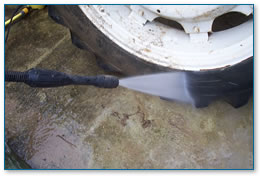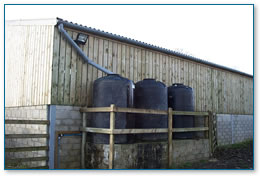clean
water
‘Clean water’ is
water that is naturally pure or has been purified. Other than rainfall
or water from a well or borehole, it is supplied by the Water Companies.
Some farms might use water from a borehole (G1)
for washing, flushing toilets or drinking water for animals (not
people). Some of the suggestions on how to prevent clean water being
wasted on a farm are similar to those for the home and school.
 |
Cleaning farm
machinery with pressure washer |
On a farm, clean water is used
for a range of purposes, such as feeding livestock, irrigation (watering
crops), washing livestock and crops.
Wasting clean water also wastes
money, as the Water Company does not supply clean water free of
charge. Wasting clean water is also not very good for the environment.
This is because water is unnecessarily abstracted (removed) from
rivers, the ground and reservoirs. Refresh your memory by looking
at Death of a River (E06).
There are things that can be
done on a farm to stop clean water being wasted.
Sometimes using clean water is
not necessary and sometimes it is, as in the final cleaning of a
vegetable crop. Are there times when clean water is used but recycled
water could be used instead? (see Dirty Water W07e)
By doing this farmers would be refusing to use clean water at times
when it is unnecessary (W11).
Is it possible to reduce the
amount of clean water used? A simple way of doing this is by making
sure that water meters work so that leaks can be identified and
dealt with.
Has the amount of water needed
to water crops been calculated correctly? Watering crops at night
can also help reduce the amount of clean water needed on a farm
because in during the day water will be lost through evaporation
before it reaches the roots of the plants.
Sometimes crops are irrigated
(watered) using sprinklers, which spray water over the plants from
above. If water is directed to the root of a crop it can help reduce
the amount of water needed as the plants have a better chance of
getting all that is provided.
Instant hot water heaters could
be installed to prevent water being wasted waiting for the tap to
run hot. Hose pipes and pressure washers should only be used when
they are really necessary, and water tanks could be covered to stop
evaporation.
|
|
|
Cow
operating pasture pump
|
|
Some ways
of providing water for livestock to drink and reduce
the amount of clean water wasted, is by only supplying
on demand. A pasture pump does this. See the information
in the Agriculture and Land Management Section about
pasture pumps and stock drinking (L06g1) |
|
|
Pasture
pump |
|
|
An opportunity
for saving rainwater |
 |
Rainwater being
saved in water butts |
Collected rainwater or water
that has been used elsewhere on the farm could be used again. Reusing
water can prevent clean water being wasted (W11).
Some water could be recycled
(W11). Water could be used again for
the same farm activity, for example growing vegetables. The water
used for washing vegetables could be recycled for irrigating a crop.
Remember by reducing the
amount of water being abstracted from the water cycle by farms,
other industries, schools as well as at home, wildlife can really
benefit.
|

